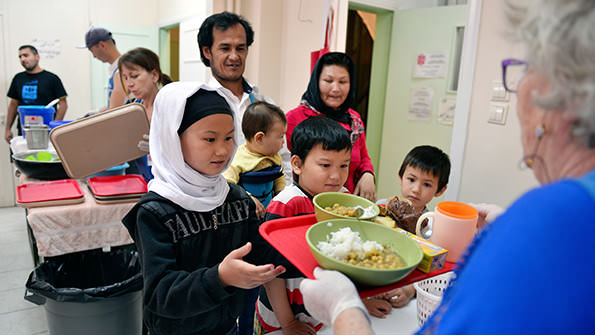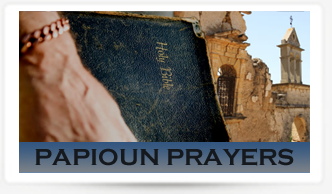Diverse, desperate migrants have divided European Christians
Sep 6th 2015, 9:26 BY ERASMUS
Updated, 4pm GMT: To include Pope Francis's call on all European parishioners.
HOW are the guardians of Europe's historically dominant faith reacting to the hundreds of thousands of people who are now trying to reach the continent's heart in search of relief from war or poverty? In two diametrically opposing ways. On one hand, European churches and religious charities have played a prominent role in succoring migrants and campaigning for them to be treated decently. On the other, politicians on the nationalist right are beating the drum of Christian nativism; they have redoubled their warnings about the threat to Europe's long-established religious culture.
And in several countries, that is leading to some harsh public arguments between rival camps and rival readings of Christianity: broadly speaking, between right-wing politicians and progressive clerics. In Italy, for example, Catholic churches and welfare agencies have found a new passion as helpers of poor migrants and as lobbyists for their interests. Pope Francis set the tone two years ago when he made a trip to the island of Lampedusa, where migrants were arriving, and made an eloquent denunciation of the "globalization of indifference". The church's involvement with helping migrants predated that trip, and it has become even more visible this year. Today the pope urged every parish and religious community in Europe to accommodate a refugee family.
But not all Italian Catholics, or their would-be political representatives, approve. Over the past few weeks, there have been some cantankerous public exchanges between a senior prelate and a rising politician of the right. Matteo Salvini, leader of the Northern League party and advocate of a new brand of Italian nationalism, has been sparring with Nunzio Galantino, the secretary of the Italian bishops' conference. In a barbed rebuttal of anti-immigrant stereotypes, Bishop Galantino said politicians who played on xenophobic feelings were themselves "street-pedlars" or travelling salesmen hawking worthless trinkets; Mr Salvini said that as an ordinary, fallible Catholic he was at least as entitled to speak out as any "communist bishop", and that he knew many people inside the church who shared his feeling that Italians must put their own interests first.
In Germany, progressive church leaders have been among the leading critics of Pegida, an anti-Muslim movement which has organised street demonstrations to denounce what it calls Europe's creeping Islamisation. Only a handful of clerics have taken a different view; for example, a certain Father Paul Spätling spoke at a Pegida rally, only to be silenced by his bishop on grounds that such xenophobia is "not compatible with the Christian message of love, kindness and inclusion." Meanwhile quite a lot of German churches are offering asylum to migrants (including Muslims) by letting them live on church property where the police cannot enter and deport them.
Both in Italy and across Europe, branches of Caritas, a Catholic humanitarian agency, play a big role in advocating for migrants' welfare, even in contentious situations. The network's French arm, known as Secours Catholique, hands out food and blankets to the people who have camped out in the port of Calais, determined to reach Britain. Its English branch, CAFOD, is lobbying the government to take in more refugees from Syria and elsewhere. Caritas is also active among immigrants in Greece (see picture), even though Catholics are a small minority in that mainly Orthodox land. Greece is yet another country where the Christian response to migrants has been conflicted; Ieronymos, the Orthodox archbishop of Athens, has called on compatriots to be generous to all newcomers, while the ultra-rightists of Golden Dawn (whose rhetoric ranges from Christian nativism to neo-paganism) claim to have plenty of secret supporters in the ranks of the church.
But even for churches and charities who have no political agenda, the influx of migrants poses dilemmas. Without implying that they are indifferent to anybody's suffering, European churches have, as one would expect, condemned with particular ire the destruction of ancient Christian communities and institutions in Iraq and Syria, as well as the travails of Christians convicted for blasphemy or apostasy in places like Pakistan or Sudan. For some churches in Europe, the connection with co-religionists abroad is human as well as moral; in Britain, for example, there is a small but vigorous community of exiled Iraqi Catholics who are in close touch with kin in the old country.
Does that mean, then, the churches and church-based charities should also care more about refugees who are Christian than about others on the move? There is a range of different answers. Some charities have the explicit aim of protecting Christians in the Middle East and other rough places, and at least informally, that concern continues when the people in question move elsewhere. But there are also religiously-inspired charities likeChristian Aid whose mission statements make clear that their aim is to fight poverty with equal concern for people of all creeds.
Another dilemma for religious relief workers: should they, at the risk of being seen to exploit the vulnerable, treat the succor of migrants as an opportunity to urge them to become Christian? In the front-line Italian port of Catania, a spokesman for Caritas insisted to RNS news service that his team helped all comers and avoided proselytizing. "On Sunday we hold mass. Whoever wants can come, but there is absolute freedom." On the other hand, there is a Protestant pastor in Berlin who has baptized hundreds of immigrants from Afghanistan and Iran, according to a news report that has been widely circulated in recent days. While nobody can judge the sincerity of the converts' motivation, conversion will make it easier for them to gain asylum: they can now claim that if they were sent back to their homelands, they would be executed for apostasy. So for any refugee whose personal religious feelings are not very strong, switching from Islam to Christianity could be a prudent move.
Life might be easier for European churches if a neat line could be drawn between (i) benighted lands far away, where bad things happened and co-religionists had to be supported, and (ii) the flatter, more orderly playing-field of Europe where people could expect, from the moment they arrived, to be treated as free and equal human beings, so that no group needed or deserved more help or attention than any other. For better or worse, no such line exists. The bad developments of benighted lands have arrived in Europe's heart, and European churches are having to make their choices, some of them difficult, accordingly.

















